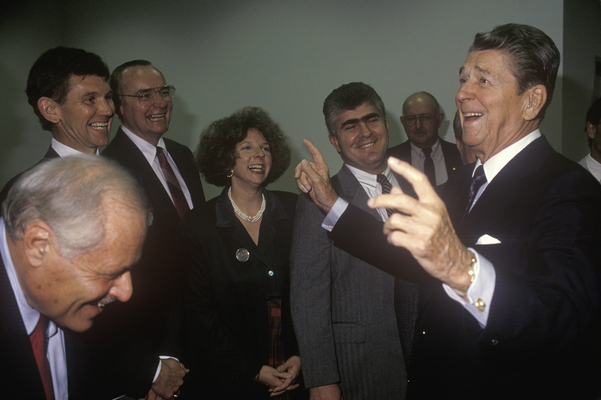President Ronald Reagan — the patron saint of two to three generations of Republican Party policymakers and figureheads — is most commonly remembered today for one thing — his rhetoric. Certainly, I am not alone in noting that Reagan’s speeches — A Time For Choosing, his First Inaugural Address, the Evil Empire speech, etc. — transformed me from a young nominal conservative into a committed and convicted devotee. He persuaded me, as he did millions of Americans. I know what I have believed, politics-wise, because of Reagan.
The Gipper wasn’t always right, of course. But he was unfailingly reasonable. If he believed something, he could explain it. Granted, actions speak louder than words, but the Great Communicator proved that actions don’t speak at all without words. He recognized the need for persuasion — the art of employing language to, at minimum, convince the country of the cogency of his worldview. He was, in other words, his own best explainer. Unlike other presidents, Reagan did not simply act and leave it to the public to elucidate his course. He laid it out himself, plainly, explicitly, and expertly — a gift few presidents since have possessed.
It is for this reason that Reagan is remembered so fondly for his speechmaking. Average presidents give speeches that speak to the precise historical moments in which they are spoken. Reagan, like Lincoln and Kennedy before him, spoke for all time. He mastered the universal American language — replete with references to self-governance, freedom, faith, the dangers of big government, and the evils of tyranny — relevant from the Founding Era through the 1980s and into the modern day.
SEE ALSO: Happy Ronald Reagan Day! Remember that time Reagan called for a Convention of States?
But rhetoric — meticulously crafted to express Reagan’s sense of the ideal — only tells part of the story. It cannot tell of his less than glamorous but no less crucial political logrolling — what one Reagan historian called his “tactical flexibility.” We often forget this. Reagan did not win the Cold War because he could weave a good narrative of pro-American jargon. Idealistic one-liners, popular as they may have been at home, did not hold the same sway over Mikhail Gorbachev. Nor could his soundly Republican one-liners win over Democrat opponents. No, Reagan won the Cold War and cut bipartisan deals, among other achievements, because he knew how to compromise. He knew how to barter. He understood that politics is, inherently, a game of give and take, in which the slow and steady — the patient, the statesman, the negotiator — wins the race.
“In case after case, Reagan demonstrated the flexibility necessary to advance his conservative agenda,” wrote H. W. Brands, the author of “Reagan: The Life.” “He called for cutting taxes, and he was astonishingly successful in doing so, reducing by half the top rate on personal income. But” — and this is where today’s political purists lose interest — “he was willing to accept slight tax increases when necessary to consolidate gains already made and to achieve other conservative goals, such as streamlining the tax code and putting Social Security on a sounder footing. His willingness to accept less than his maximum program similarly made possible broad deregulation of business and a landmark immigration reform act” [emphasis added].
As Reagan himself so wisely put it, “I’d rather get 80 percent of what I want than go over the cliff with my flags flying.”
SEE ALSO: Heroes of COS: The Sage of Self-Governance
Regrettably, today’s Republican Party seems to have completely forgotten that lesson. We view settling for anything less than 100 percent as an outrageous betrayal and retreat. We’d rather get zero, rather “go over the cliff,” than “accept less than” our ideal.
Reagan, somehow, could do both — that is, he could believe quite firmly in the ideal while at the same time still accepting less than that when necessary. And because of it, he actually made a difference. He actually made progress.
Today, on what would have been the Gipper’s 113th birthday, Americans across the spectrum are still gleaning from his pool of wisdom. If only we would relearn the lessons he taught us about statesmanship, flexibility, and political workability, we might finally recapture the yet-unparalleled success of the Reagan Revolution.
Happy 113th birthday, President Reagan. Thank you for everything you taught us.
Published in Blog on February 06, 2024 by Jakob Fay


